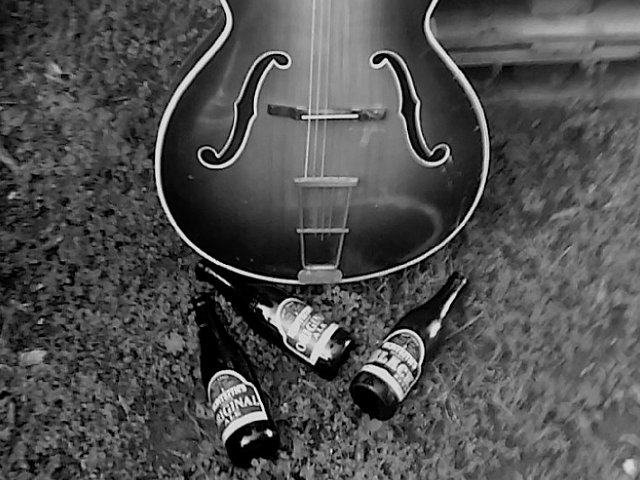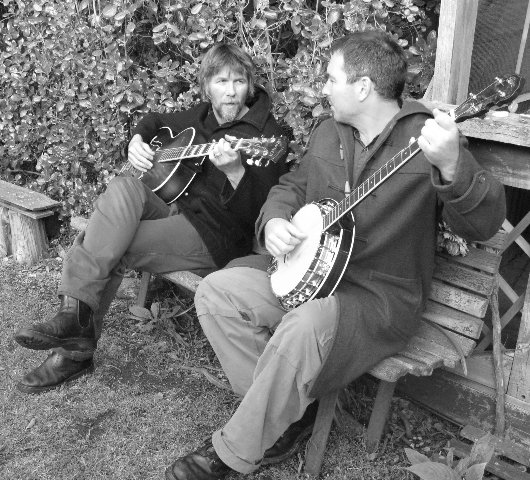One of the great pleasures of writing on Public Address is the lovely people you end up corresponding with. In my case, none more so than musician and composer, Blair Parkes.
I've followed Blair's music for years: from his work with 'Range', '103', and 'Thomas-Parkes' -- to his current band the l.e.d.s. His songs have always struck me as particularly authentic. Although Blair's style has roots in the Flying Nun tradition, it has evolved and flourished through his own unique and idiosyncratic musical approach. He sings in a New Zealand accent; he writes appealing tunes with wry and intelligent lyrics; his arrangements are tasteful and understated.
A few months ago, after exchanging emails with Blair for several years (as well as the occasional random meeting in person), I plucked up the courage to send him a couple of pieces that I'd composed. He seemed enthusiastic -- or, at least, he was very polite -- and we agreed to get together for a few bottles of Monteith's and a "wee spot of music".
After only a few minutes playing together, it became apparent (to me, at any rate) that -- musically speaking -- Blair and I got on like a house on fire. In philosophical terms, we shared many of the same views on the way that music should be played and composed. Or, to be strictly truthful, Blair hardly disagreed when (at great length) I expounded upon my own personal musical philosophy. Now that I think of it, he may just be a very non-confrontational person.
To my surprise, Blair even remained unfazed when I declared that the frailing banjo was a sadly overlooked instrument in the New Zealand musical tradition (the banjo pre-dates the guitar in this country by several decades). And he barely raised an eyebrow when I produced an actual banjo and began to play. Not many people can maintain that degree of composure.
Most importantly, perhaps, it transpired that we both enjoyed the same type of beer. Our initial "wee spot of music" has turned into a regular weekly event. Each Friday night I grab my banjo and a few bottles of Monteith's, hop on the No. 84 bus, and trundle off to Blair's shed in New Brighton.

Above: Another successful evening spent composing music.
For me, music has always been emotional rather than cerebral. But, over the course of our Friday night Monteith's sessions, I've tried to analyse my musical emotions. Curiously -- and I am rather loathe to admit this -- I suspect that one of my formative influences has been that much-despised musical form: the New Zealand Bush Band.
Not, I hasten to add, that I want to break out a washboard or 'the spoons' -- but I must admit that there was something in the Bush Bands that I heard as a lad (they were in their twilight years during my early childhood) that resonated with me. A comfortable looseness in playing; a pleasant degree of unpolishedness; an almost unfamiliar New Zealand perspective and vernacular.
And incidentally, I'm quite convinced that some of my favourite Australian bands -- Nick Cave and the Bad Seeds, for example -- have taken some influence (perhaps subconsciously) from the distinct bush band music of their own country.
Eventually -- and possibly as a result of spending too much time around German artists -- I wrote down my thoughts in the form of a musical manifesto. Though I say so myself, it's a pretty good manifesto; and Blair only disagrees with about half of it. Luckily for me, he is an easy-going character, and contents himself merely by occasionally murmuring: "Do we really need to write this down?" and "Don't you think a manifesto is, y'know, a bit rigid?"
None of this, of course, was intended for public consumption. But it so happened that I sent one of our beerier recordings to l.e.d.s fan, Russell Brown, just so he could hear what the l.e.d.s keyboardist got up to on his days off. To my astonishment, Russell declared that he loved the song, and expressed a wish to hear some more. He even went so far as to suggest that it should reach a wider audience.
Naturally, such a suggestion was anathema to Blair and me. Didn't Russell comprehend the concept of music merely as a means of private expression? Didn't he understand that we were sensitive artists -- who shouldn’t have our talents brutally exposed to the hoi polloi? Didn't he realize that his suggestion was a betrayal of everything that our music stood for?
"Well, I could pay you in beer," replied Russell.
And so here we are.
The E.P. of music presented herein is performed and recorded according to our (slightly disputed) manifesto. In short:
- Playing should emphasize feeling rather than slickness.
- Songs should be simple, brief, and to the point.
As a consequence of the above, some of these recordings are more Monteithsy than others. In fact, some of them are nearly all Monteith's, and only a little bit musical. We admit that the singing on the song 'I Found Out', for example, is almost exclusively Monteith's.
The project is called, for obvious reasons, Bridle Path. As I mentioned before, none of this music was ever intended for public consumption, and will certainly not be to the majority of people's taste. But, at the very least, for those -- like me -- who have followed Blair Parkes's career, it will be an interesting view on a completely different side of his musical talents. You certainly couldn't mistake it for the electronica of the l.e.d.s.
Many thanks to Russell Brown and Monteith's Breweries for providing the raw materials to lubricate these recordings.
Download the 'Monteith's Sessions E.P.' as a ZIP file with MP3s and cover art (7.8MB) [right-click on the link and choose "Save Target As..."]
or:
Click here to listen to streaming audio of the 'Monteith's Sessions E.P.' on the Bridle Path MySpace page.
[Note: The E.P. is free to copy and distribute, but it is copyright, and Bridle Path assert their moral right to be identified as the author(s).]

Above: Bridle Path in action.